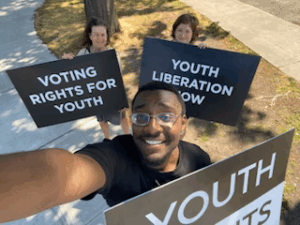There is an interesting back and forth going on right now between two great advocates for student rights, the Foundation for Individual Rights in Education and StudentActivism.net. Both seem to agree that offensive speech on campus needs to be protected. At issue is whether it must also be condemned. Roger Shibley of FIRE says no, Angus Johnston of Student Activism says yes.
Both make very interesting arguments and raise interesting points. Broadly I believe, yes, offensive speech should be both protected and condemned. I am routinely shocked by how many people seek to excuse racist comments, jokes and stereotypes by saying “oh, its just a joke, I’m not racist.” Just because you’ve never lynched someone doesn’t mean you aren’t racist.
For those of us in the movement against ageism, we know how no one thinks twice about making offensive comments about age. No one, surely not NYRA, would support banning ageist comments, but undoubtedly the social acceptability of ageist thoughts and comments allows ageist laws and actions to persist. If we believe that all people should be seen as individuals not as stereotypes of their race, age, sex, sexual identity, faith and the like then we need to speak up when we see someone diminish another by talking about them as a stereotype. It is often hard to muster the courage, but through our silence we endorse the offensive speech and make it more socially acceptable.
To step back from the broad idea of condemning offensive speech, the particulars here are more nuanced, which is why this post is more of a question than a statement. I am interested to hear what others have to say. Roger Shibley contends that FIRE’s only objective is protecting free speech and to spend time also condemning speech not only pulls them away from their mission but alienates the potential victims of censorship it seeks to help. Angus Johnston believes that they weren’t neutral on the offensive speech, they were excusing or supporting it. He believes such a tone causes many to see FIRE as a conservative organization instead of non-partisan and could narrow their support. As I said, it is an interesting debate from both directions.
The debate began, as such debates often do, with someone posting something offensive on the Internet. In this case it was a white UCLA student posting an anti-Asian rant on YouTube:
In response, the student was investigated by the school, condemned by the chancellor and was threatened. FIRE then came to her defense. Angus Johnson claimed FIRE had a responsibility to denounce offensive speech even as they protect it from censorship. Roger Shibley shot back to say their job is to be neutral and not take sides beyond the side of free speech. Angus Johnson responded that they weren’t just neutrally defending her right to speak but defending what she said as well. And… unless I missed something, I believe that is where it stands now. So what do you think?






Ha! I had considered writing about this here myself, but wasn’t sure I’d do it justice, at least not from a NYRA platform. Might say something over on Sure, Why Not?.
I can see both sides, though I’m leaning towards Angus. I very much agree with both that the best remedy for bad speech is more speech, that censorship should be out of the picture, and while what Wallace said was horrible, she definitely shouldn’t be expelled for it. That said, Angus is right that we can’t ignore the fact that what she is saying is the sort of sentiment that condones discrimination and should be condemned. But I think in having that conversation, having a peaceful dialogue (admittedly very difficult with racism issues!), there can actually be a positive outcome here, to promote the understanding so people will think twice before doing this sort of thing.
Hi NYRA! We are fans of your work. As I just posted on Angus’ site and on his comment on the FIRE FB site:
Hi Angus. There are two points that I want to make sure readers know, and I would appreciate your help to that end. When Robert Shibley called the UCLA student’s racist rant “pretty tame,” it was in this context: “in my opinion it is really pretty tame, as far as Internet rants go.” (Indeed, here’s the whole sentence: “If you watch the video, it is easy to see why Asian students in particular, and others as well, might find it offensive—although in my opinion it is really pretty tame, as far as Internet rants go.”) Robert was saying that there is much more offensive speech on the Internet. You can agree or disagree with that, but without including those few additional words (“as far as Internet rants go”), Robert’s quote seems like an absolute judgment as opposed to a comparison to the extreme speech one can find on the Internet.
As for Robert writing that the speech was “not particularly severe,” in context you can see, he was analyzing through the legal definition of peer-on-peer harassment in the educational context, which requires speech to be “so severe, pervasive, and objectively offensive, and that so undermines and detracts from the victims’ educational experience, that the victim-students are effectively denied equal access to an institution’s resources and opportunities.” Davis v. Monroe County Board of Education, 526 U.S. 629, 652 (1999). As an attorney, Robert is quite confident (as am I, Eugene Volokh, and, I believe, you) that the video is not discriminatory harassment. Analyzing the “severity” prong is part of making that determination.
As you have noted in previous posts, FIRE has written a lot of things at this point about the UCLA case. On our blog, FIRE staffers have taken varying tones and approaches (something I encourage) to show how the original video is protected speech and how people have responded with more speech, all of which I encourage readers to see here: http://thefire.org/case/857.
Greg Lukianoff
President
FIRE
Thanks for weighing in here! Great to hear from you directly on this! NYRA is, of course, not taking a side in this particular issue, just trying to expose our members to the interesting debate that is developing and the many good points on either side. As always we appreciate your work defending the free speech rights of students on campus!
Alex Koroknay-Palicz
Executive Director
NYRA
i think that we need to protect all speech that you can say in the outside world